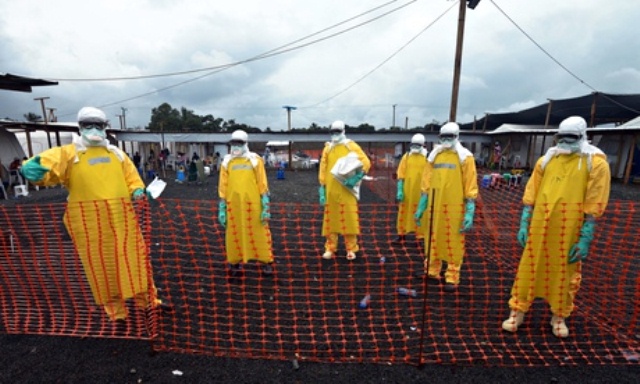
The flu-like Severe Acute Respiratory Syndrome infected 1,800 people and took 299 lives in the southern Chinese city. Panic spread, emptying usually busy streets and restaurants and causing the property market to dive.
But swift moves to quarantine at-risk residents brought the outbreak under control, while transforming long-term attitudes to disease and streamlining the city's alert and response systems.
Eleven years later, the legacy of SARS can still be seen every day in Hong Kong. Many residents don surgical masks at the first signs of a common cold; disinfectant dispensers are dotted around buildings, and signs next to elevator buttons boast of hourly sterilisation.
"All this came about after SARS," said Nelson Lee, head of infectious diseases at the Chinese University of Hong Kong.
"At the time of SARS, Hong Kong had no isolation facilities, or very few - and in general, the medical profession was not aware of the importance of infectious diseases. We have come a long way."
Hong Kong hospitals now feature emergency isolation rooms, while travellers must pass through temperature scanners at the borders.
Taking no chances in one of the world's most densely-populated cities, authorities set up a government body to coordinate the response to similar crises in the future.
The SARS virus first emerged in late 2002 in Guangdong, southern China, and was carried to Hong Kong by a doctor.
Staying in a four-star hotel, he passed it to international guests and visitors who eventually helped the disease spread to dozens of countries, affecting 8,000 people worldwide and killing some 800.
Nearly 350 of the deaths were in mainland China, while Asian neighbours including Taiwan, Singapore and Vietnam were also hit.
Since then, Asia's mechanisms for dealing with infectious disease have been tested several times.
The H5N1 strain of bird flu has killed more than 400 people, mainly in Southeast Asia, since first appearing in 2003. Another strain of bird flu, H7N9, has claimed more than 170 lives since emerging in 2013.
Experts say the experience of dealing with these viruses stands Asia in generally good stead should it face an outbreak of Ebola, which has yet to make it to the continent.
The tropical virus has claimed almost 5,000 lives so far, the vast majority of them in west Africa.
"Generally speaking, the level of readiness is probably more similar to the level of readiness of Europe rather than Africa," said Isabelle Nuttall of the World Health Organisation.
Quarantine drills have been held from China and Hong Kong to Singapore and the Philippines, while many Asian countries have tightened airport screening processes.
In an extreme case, isolated North Korea on Thursday said it intends to quarantine all foreigners entering the country for 21 days, no matter their country of origin.
But experts stress some nations are better positioned than others to deal with an outbreak, and warn that no detection system is foolproof. Ebola does not always manifest itself in the form of a fever, for instance -- so someone carrying the virus could pass undetected through even the most high-tech of airport temperature scanners.
"No machine is 100 percent, so no matter what we do there will be a small risk of a case slipping through the net," said Nelson Lee, head of infectious diseases at Hong Kong's City University.
Experts have pointed to China as potentially vulnerable to an Ebola outbreak.
Beijing has massively expanded its diplomatic and commercial efforts in Africa in recent years, seeking resources to drive its hungry economy. Now Africa's largest trading partner, thousands of workers travel between the two every year.
"In today's globalised world, even if there is an epidemic thousands of miles from home, everybody in the world is at risk," said microbiologist Peter Piot, who co-discovered Ebola in 1976.
"Thousands and thousands of Chinese workers and people are in Africa now... so it is not impossible that one of them will go to China," said Piot, describing China as "quite vulnerable".
Malik Peiris, a Hong Kong-based expert who played a key role in identifying SARS, highlighted the cities of Beijing, Wuhan and Guangzhou as key destinations for west African business travellers.
China was heavily criticised for its initial response to the SARS outbreak, accused of covering up reported infections.
But Peiris said Chinese authorities learned from SARS that transparency is key when it comes to a public health scare.
In the wake of the H7N9 outbreak they have moved swiftly to shut down "at-risk" poultry markets, while providing regular updates on infections.
"Compared to the situation before SARS, there has been a sea change in the preparedness in mainland China," said Peiris.
1724760612-0/Untitled-design-(12)1724760612-0-405x300.webp)
















COMMENTS
Comments are moderated and generally will be posted if they are on-topic and not abusive.
For more information, please see our Comments FAQ